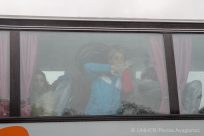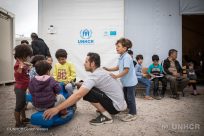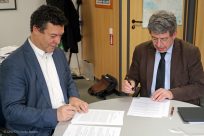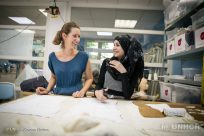UNHCR study shows rapid deterioration in living conditions of Syrian refugees in Jordan
UN High Commissioner for Refugees António Guterres says large numbers of Syrian refugees are sliding into abject poverty, and at an alarming rate, due to the magnitude of the crisis and insufficient support from the international community.
He made the statement at the launch of a new UNHCR study, Living in the Shadows, which reveals evidence of a deepening humanitarian crisis. High Commissioner Guterres is on a two-day visit to Jordan, where he will meet refugees profiled in the study in Amman and others at the Za’atari refugee camp.
“I am here to express my solidarity with Syrian refugees, as the impact of snowstorm Huda is still tangible and posing an even greater strain on their already dire living conditions.” Guterres is also meeting with Jordanian officials and with donors to coordinate efforts to improve living conditions for Syrian refugees and support the communities hosting them.
Conducted by UNHCR and International Relief and Development (IRD) the study is based on data from home visits with almost 150,000 Syrian refugees living outside of camps in Jordan in 2014.
According to the study, two-thirds of refugees across Jordan are now living below the national poverty line, and one in six Syrian refugee households is in abject poverty, with less than $40 per person per month to make ends meet.
Almost half of the households researchers visited had no heating, a quarter had unreliable electricity, and 20 per cent had no functioning toilet. Rental costs accounted for more than half of household expenditures, and refugee families were increasingly being forced to share accommodations with others to reduce costs.
“Unless the international community increases its support to refugees, families will opt for ever more drastic coping strategies,” Guterres said. “More children will drop out of school to work and more women will be at risk of exploitation, including survival sex.”
As the Syrian conflict approaches its fifth year, many refugees are becoming increasingly dependent on assistance. Jordan’s resources and infrastructure, too, have been stretched to the limit.
In an effort to address this critical situation, UNHCR is providing monthly cash assistance to 21,000 of the most vulnerable Syrian families, or 14 per cent of the Syrian refugee population living outside camps. As of the end of 2014, over 10,000 additional Syrian refugee households have been identified as eligible for such assistance but, due to lack of funds, cannot be provided with support.
Overall, the report’s findings make it clear that any further reductions in the current levels of support will have immediate and serious consequences for Syrian refugees in Jordan. The situation is particularly worrying for the most vulnerable populations, such as female-headed households and elderly refugees.
Guterres emphasized that this crisis can be mitigated if the international community steps up efforts to alleviate the suffering of the refugees. He praised the efforts of the Jordanian authorities, UNHCR and its partners to address the urgent needs of refugees during last week’s heavy snowstorm.
In total, Jordan has a registered Syrian refugee population of 620,000, some 84 per cent of whom live outside camps.
“This represents a dramatic pressure in the economy and the society of the country not to mention the terrible security impact of the Syria crisis in itself,” Guterres said.
“The generosity of the Jordanian people and the Government needs to be matched by massive support from the international community – support for the refugees themselves and for the local populations hosting them, but also structural and budgetary support to the Jordanian Government for education, health, water and sanitation and electricity to enable it to cope with this enormous challenge.”
Additional Information:
– The “Living in the Shadows” report is available on our media page at: http://unhcr.org/jordan2014urbanreport/.
Page 12 of 26
-

UNHCR’s Intervention at the hearing for actors to the Standing Committee of Public Administration, Public Order and Justice of the Hellenic Parliament regarding the Draft Law on the Improvement of Migration Legislation
9 May 2020Honorable Mr. President, MPs, Minister and colleagues, We would like to thank the Committee for inviting UNHCR to participate in the hearing and note that we will submit by the end of the day a Memorandum with detailed comments on specific articles for further study by Members of Parliament. The […]
-

UNHCR is moving out of overcrowded Moria elderly and vulnerable to minimize public health risks
24 Apr 2020Mytilene – As an emergency measure to limit the risk of COVID-19, UNHCR, the UN Refugee Agency, has moved 122 elderly and immune-suppressed asylum seekers to rented hotels on Lesvos island. In coordination with the Ministry of Migration and Asylum and the National Public Health Organization (EODY), UNHCR has undertaken […]
-

Racist Violence Recording Network: Serious concern over attacks against refugees and humanitarian workers
5 Mar 2020Athens, 5.03.2020 – The Racist Violence Recording Network (RVRN) strongly condemns the recent incidents targeting refugees, asylum seekers, and humanitarian workers on the Greek Aegean islands and at Evros. In recent days, the member organizations of the RVRN witness numerous and escalating xenophobic and racist incidents, by groups of some […]
-

UNHCR deplores attacks against humanitarians on Greek islands, appeals for calm
2 Mar 2020UNHCR, the UN Refugee Agency, appeals for calm and restraint after a series of deplorable and intimidating acts on the Greek Aegean islands against refugees and migrants, humanitarian workers, including a UNHCR staff member on Lesvos and the arson of a UNHCR transit site for new arrivals on Lesvos’s north […]
-

UNHCR and University of Athens sign Memorandum of Understanding on communications and forced displacement
27 Feb 2020UNHCR, the UN Refugee Agency, in Greece and the Department of Communication and Media Studies of the National and Kapodistrian University of Athens have this month signed a Memorandum of Understanding to establish and strengthen their cooperation on communications and forced displacement. The initial focus of the cooperation will be […]
-

Racist Violence Recording Network: Justice to uphold the Rule of Law in Greece
15 Jan 2020The Racist Violence Recording Network is following with great interest the Golden Dawn trial, to which it has been summoned to testify on behalf of the legal team of the “Egyptian fishermen case” – one of 154 incidents that the Network recorded in 2012. Since its establishment in 2011, the […]
-

Conference in Athens highlights importance to invest in integration for refugees in Greece
24 Dec 2019In the aftermath of the Global Refugee Forum, a two-day conference on the social integration of beneficiaries of international protection in Greece concluded last week in Athens. The event, which was jointly organized by the Greek National Commission for Human Rights and UNHCR, the UN Refugee Agency, aimed at taking […]
-

Conference on Social Integration of Refugees in Greece
17 Dec 2019As the first-ever Global Refugee Forum will be concluding its proceedings in Geneva, the National Commission for Human Rights and the UNHCR Representation in Greece organize a two-day conference on the “Social Integration of Beneficiaries of International Protection in Greece: Achievements, Challenges and Prospects for the Future”. The event will […]
-

UNHCR saddened by death of Afghan mother of three on Lesvos island
5 Dec 2019UNHCR, the UN Refugee Agency, is deeply saddened by the death of a 27-year-old Afghan woman late last night at the Kara Tepe accommodation site on the Greek island of Lesvos. The mother of three was killed in a fire which started at the container where she lived with her […]
-

UN High Commissioner for Refugees Filippo Grandi to visit Greece
25 Nov 2019UN High Commissioner for Refugees Filippo Grandi will conduct his third official visit to Greece on 27 and 28 November 2019. The High Commissioner will visit Lesvos island and Athens and is scheduled to meet with the Prime Minister Kyriakos Mitsotakis and other members of his Cabinet. He will also […]
